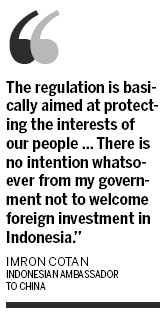|
 |
Bilateral trade between China and Indonesia will keep expanding this year despite recent moves by Jakarta to curb foreign investment in the mining industry and limit raw mineral exports.
Indonesian Ambassador to China Imron Cotan told China Daily that the prospects for bilateral trade, which increased from $23 billion in 2009 to $61 billion last year, are "absolutely promising".
The figure is likely to exceed $70 billion this year, he added.
"Indonesia has maintained strong demand for Chinese exports, thanks to its steady economic growth at an average of 6 percent in recent years and a rapidly growing middle class with high purchasing power," he said.
Indonesia, with a total GDP of more than $1 trillion and a population of 240 million, is the biggest economy in Southeast Asia.
The nation is aiming for 7 percent GDP growth this year.
China is Indonesia's second-largest trade partner, and Indonesia supplies more than half of China's imports of nickel ore, bauxite ore and coal. The two countries want to lift bilateral trade to $80 billion by 2015.
In February, the Indonesian government issued a regulation restricting foreign holdings in the nation's mines to no more than 49 percent after their 10th year of production.
"The regulation is basically aimed at protecting the interests of our people ... There is no intention whatsoever from my government not to welcome foreign investment in Indonesia," Cotan said.
Indonesian Energy and Mineral Resources Minister Jero Wacik told a news conference on Thursday that the country will implement a tax on the export of 14 raw minerals at an average of 20 percent from Sunday, and miners will no longer be allowed to export raw materials from that day unless they submit plans to build smelters for completion by 2014.
The curbs apply to raw metals including iron ore, gold and silver, while the coal export duty is still in the pipeline. The nation intends to ban the export of all raw materials except coal by 2014, according to Cotan.
"We would like foreign investors to add some value to the mineral products. We would like them to export the products processed. We no longer want to export raw materials. We would also like to import technology for construction, smelters and power plants," he said.
He Wei, a researcher from BOCOM International, said that it would be very difficult for the Indonesian government to greatly increase coal export duty as its significant role in foreign trade cannot be reduced in the short term.
A report on Fubao, a Shanghai-based non-ferrous metals website, said that the Indonesian government will face great difficulties in fully banning exports of raw minerals due to the potential impact on the nation's economy. It would be more practical for the government to impose a tax or quota on raw mineral exports, said the report.
Cotan said "as one of the richest countries in mining, we are very optimistic that the new regulation will not affect or deter foreign investors from investing in Indonesia ... Chinese investors' enthusiasm to invest in Indonesia remains undeterred".
More than 15 top officials from Chinese companies have shown great interest in exploring investment opportunities in Indonesia's manufacturing sector, and are scheduled to visit the nation in early May to survey the market and meet potential partners, and decision-makers, according to the embassy.
lijiabao@chinadaily.com.cn
